On International Day of Families 2025, the tennis world takes a step back from the baseline to celebrate something deeper than rankings and rivalries: the unshakable foundation of family. As fans scroll through heartfelt Instagram tributes and behind-the-scenes family moments, one thing becomes clear—family success in professional tennis isn’t just a theme, it’s a legacy.
From Casper Ruud, the calm Nordic warrior guided by his father and coach, to Ben Shelton, America’s rising rocket whose journey began in a family of tennis minds, the ATP and WTA tours are full of stories where family isn’t just part of the journey—it is the journey. Let’s take a deep dive into how these players thrive through the strength of their families, and why, in tennis, blood ties often create the boldest champions.
Casper Ruud: Built by a Father, Driven by a Dream
When you talk about family success in professional tennis, Casper Ruud is one of the first names that comes to mind.
The Norwegian star, who made history by becoming the first man from his country to reach multiple Grand Slam finals, is more than just a trailblazer—he’s a legacy bearer. His coach and mentor? None other than his father, Christian Ruud, himself a former ATP professional.
Christian Ruud may not have achieved the same global stardom in his playing days, but his second act—grooming Casper to world-class success—has earned him a new level of respect in tennis circles. From managing his son’s junior schedule to forming Team Ruud, a tight-knit group of Norwegian staffers and close friends, Christian’s influence has been instrumental.

As Casper said in a 2024 interview, “My dad has always been in my corner, teaching me not just forehands and backhands, but how to carry myself through adversity.”
Their success is more than strategic—it’s spiritual. Their bond was most evident during Casper’s deep runs in Paris and New York, where Christian could often be seen in the player’s box, eyes locked on every point, emotions bottled up until the match point dropped.
Ben Shelton: A Father-Son Spark That’s Electrifying the ATP
In a sport that often prizes tradition, Ben Shelton has injected youthful energy—and family flair—into the professional tennis circuit.
The 22-year-old American lefty, known for his thunderous serve and trademark grin, is coached by none other than his father, Bryan Shelton, a former pro and college tennis coach. When Ben stormed into the quarterfinals of the 2023 US Open and then reached his first Masters semifinal in 2024, the Shelton story became a symbol of generational excellence.
Their journey is far from ordinary. Bryan initially didn’t push Ben into tennis—in fact, Ben only took the sport seriously at 12. But once he did, the family foundation was ready. Bryan’s experience as both a former ATP player and college coach created a blueprint for Ben’s rise: discipline, fun, and above all, trust.
Their on-court connection goes beyond strategy. It’s about knowing when to push and when to protect. “It’s about being present, not perfect,” Bryan told Tennis Channel in 2024. “We know each other beyond tennis. That’s the advantage.”
With the Sheltons, you don’t just get explosive forehands—you get a story of mentorship, mutual respect, and American optimism.
From Williams to Wozniacki: The Legacy of Tennis Families
The celebration of family success in professional tennis wouldn’t be complete without honoring the trailblazers.
Think back to Richard Williams, the father who coached Venus and Serena Williams from the streets of Compton to the courts of Wimbledon. Or Piotr Wozniacki, who sculpted Caroline Wozniacki into a world No.1 and Grand Slam champion. These aren’t just coaching stories—they’re stories of faith, sacrifice, and multi-decade commitment.
In the Williams sisters’ case, their father didn’t just coach them—he believed in them when the world didn’t. He famously wrote a 78-page plan for their tennis dominance before they’d even picked up a racquet. That’s the power of visionary parenting, of family as a driving force.
Caroline Wozniacki, meanwhile, credits her father Piotr for instilling the mental toughness that helped her withstand both the scrutiny of a top-ranked player and the pressure to win a Slam. “He wasn’t always easy on me,” she once said. “But he made me who I am.”
These stories remind us that behind every successful tennis player is often a parent or sibling who carried them through late-night practices, painful losses, and the highs of historic wins.
Sibling Success Stories: From the Plíškovás to the Raducanus
Sometimes, tennis success doesn’t just run through parents—it runs through siblings.
Karolína and Kristýna Plíšková, the Czech twins, have both competed at high levels on the WTA Tour. Though Karolína reached the world No.1 ranking, Kristýna had her share of breakout performances, and the two often credit each other for emotional support during tough stretches.
On the men’s side, the Zverev brothers, Alexander and Mischa, have also shared the ATP spotlight. While Alexander became a Grand Slam finalist and Olympic champion, Mischa was a late bloomer whose grinding style contrasted with his younger brother’s explosive power.
And while Emma Raducanu may be an only child, her close-knit relationship with her parents—especially her Chinese mother and Romanian father—has shaped her career. They’ve maintained a firm educational and cultural grounding, even as Emma has soared to international superstardom.
In all these cases, family is more than just blood—it’s backbone.
Family First: Why It Matters in Today’s Tennis World
In a hyper-competitive world like professional tennis, where athletes are often thousands of miles from home, family is more than comfort—it’s currency.
From the moment a player joins the tour, their mental and emotional wellness is as critical as their footwork. Families act as personal therapists, cheerleaders, coaches, and reality checks. In recent years, with a growing awareness around mental health and burnout in tennis, players have become more vocal about the role of family support.
Stars like Naomi Osaka and Coco Gauff have spoken about the stabilizing role their families have played. Coco’s father, Corey Gauff, was her primary coach during her meteoric rise, while Naomi has often acknowledged her sister Mari’s early influence on her game—even before the spotlight.
In 2025, with more young stars rising and the tour calendar expanding, these familial bonds matter more than ever. Whether it’s providing a steady voice in a time of doubt or simply grounding an athlete in their roots, families shape champions long before the trophies come.
Social Media Moments: Families Behind the Scenes
This year’s International Day of Families saw players posting throwback photos, candid practice videos, and family tributes. Among the most heartwarming:
- Casper Ruud posted a photo hugging his father with the caption: “From backyard rallies to Grand Slam finals. Wouldn’t be here without you, Dad.”
- Ben Shelton shared a slow-motion reel of a practice session with Bryan Shelton, writing: “Learning from the best. Grateful every step.”
- Coco Gauff uploaded a video montage of her family traveling to tournaments, adding: “My team, my heart.”
The tennis world responded with love. Fans flooded the comments with their own stories of how family inspired their love for tennis—proof that the sport’s emotional core resonates far beyond the court.

Conclusion: The Legacy Lives On
As we celebrate International Day of Families 2025, it’s clear that family success in professional tennis isn’t just a nice story—it’s the soul of the sport. From rising stars like Ben Shelton to established icons like Casper Ruud, the foundation laid by family is often the reason dreams survive pressure, injury, and criticism.
In the end, trophies may tarnish, records may fall—but the memories forged between parent and player, sibling and star, coach and child? Those last a lifetime.
So the next time you see a player raising their arms in victory, look behind the scenes. There’s probably a father with a racquet bag, a mother with a homemade meal, or a sibling with tears in their eyes. Because in tennis—as in life—family is the first team we play for.


